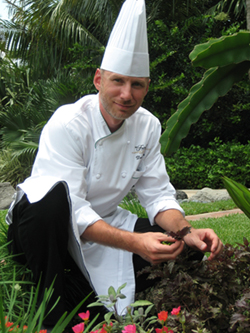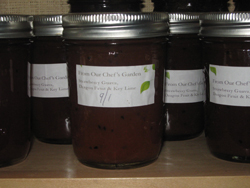
It's something you never think about, especially in vacation mode savoring that incredible meal.
Where did that tasty eggplant in the main course come from? And what about that luscious mango concoction for dessert? And the stuff that makes the house brew... the house brew?
Would you believe right on the premises?
Yes. When some hotel restaurants say their ingredients are fresh, they're not kidding. Some come straight from their gardens.
That means biodegradable soaps and sprays and weeding by hand to avoid using chemicals. And compost. Lots of it. (For those like me, who'd heard the term but weren't exactly sure what it was, it's a custom blend of organic waste, like food scraps, used to enrich the soil.)
Hotel gardens are a growing trend: Several are blooming in urban oases around the nation.
The Four Seasons Philadelphia hotel has an extensive rooftop garden. In season, it produces all kinds of oregano, sage, thyme and rosemary, basil and beets, along with lettuce, bok choy and even kiwi fruit. The soil comes from hotel kitchen scraps turned into compost by a local farmer. The cooking oil is used to run the truck that transports the compost. Some of the herbs are used all year long in the hotel's acclaimed Fountain Restaurant.
The chef at Chicago's Marriott Downtown hotel has lots of busy bees working for him. Nearly a quarter of million, in fact, who make honey in beehives on the hotel roof. It's used in the baked goods, salad dressing and the hotel's honey wheat beer. The beekeeping operation is an expansion of the rooftop garden, where beer hops are grown along with lots of other edibles. The culinary team prides itself on making nearly everything it serves in its Harvest restaurant (which has a considerable Facebook following) from scratch.
This past summer, Baltimore's InterContinental Harbor Court hotel converted a rooftop terrace into a garden yielding a bounty of -- among other things -- parsley, sage, rosemary, and yes, thyme -- and five kinds of tomatoes. Several types of mint are also harvested there, including the pineapple mint used in the hotel's Pineapple Mojito -- which gets rave reviews.
 And just across the street from Nordstrom and Bloomingdale's at a suburban Miami mall is a grand estate -- the lush grounds and quarter-acre garden at the Fairmont Turnberry Isle resort. The place has a slight advantage over the competition: Its growing season never ends, so the chef can continually try new things.
And just across the street from Nordstrom and Bloomingdale's at a suburban Miami mall is a grand estate -- the lush grounds and quarter-acre garden at the Fairmont Turnberry Isle resort. The place has a slight advantage over the competition: Its growing season never ends, so the chef can continually try new things.
Here, the ingredients are decidedly more exotic because the subtropical climate is so accommodating. The property is fertile ground for bananas, sugar cane, Meyer lemons, mangoes and star fruit, fig trees, grapefruits, Persian limes and lemongrass.
The enthusiastic head chef beams when demonstrating the mechanics of the on-site compost mixer, and loves to engage in the daily ritual of picking the day's ingredients.
The menu at the resort's Cascata Grille is peppered with all kinds of garden-fresh ingredients that make their way into everything from the Grilled Atlantic Salmon with asparagus, arugula and Florida Orange Vinaigrette, to the Veal Marsala with heirloom tomato risotto and sage.

The chef also has his own line of homemade fruit jams and marmalades. They're canned with the label "From Our Chef's Garden" and served at breakfast.
Even this non-fan of jam, who'd never tasted a kumquat, got instantly hooked on the kumquat preserves seasoned with homegrown allspice.
Now that's fresh.